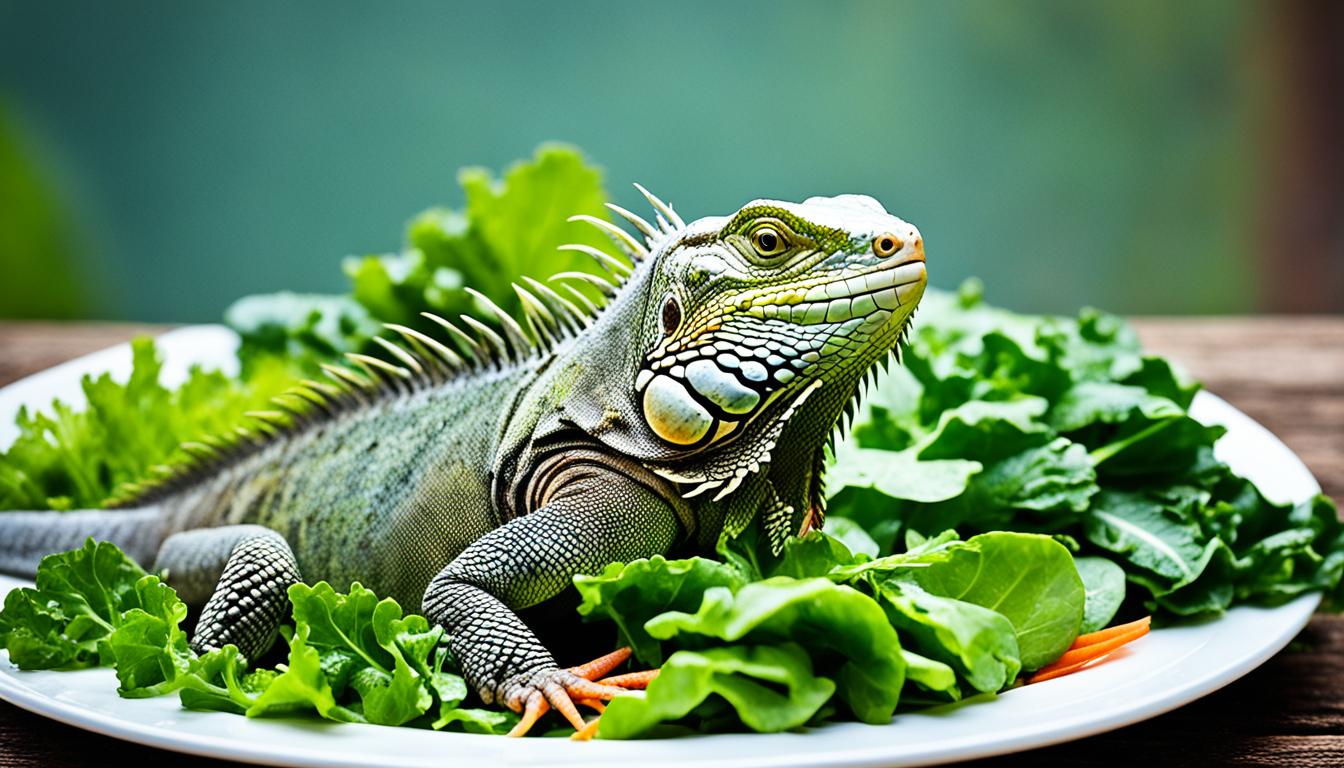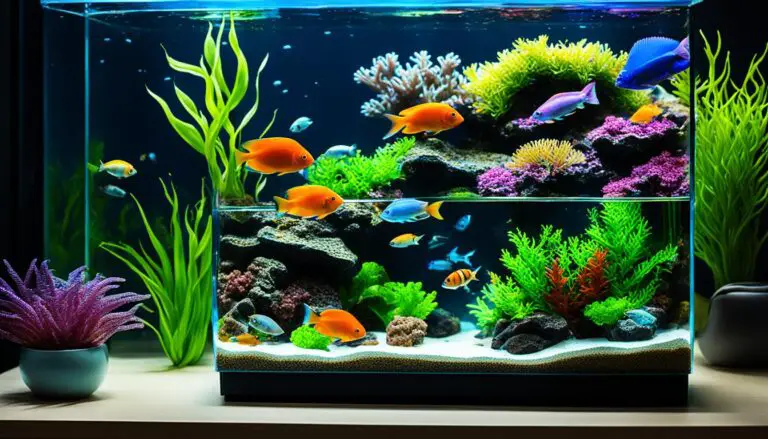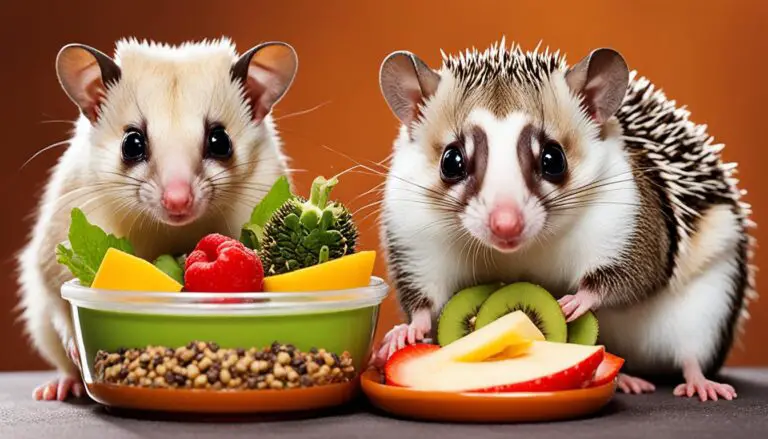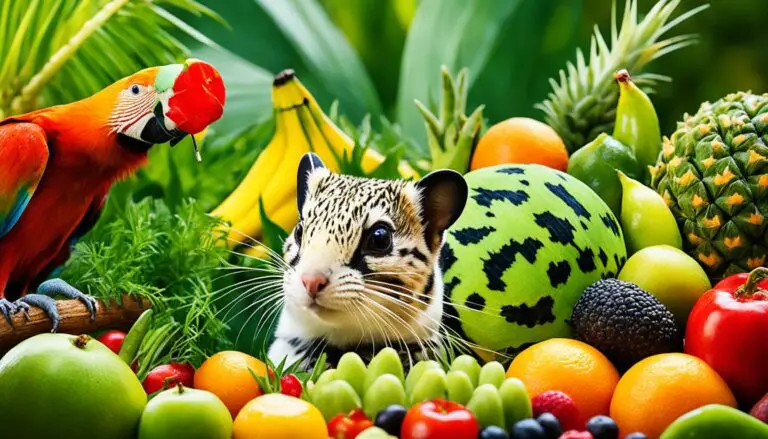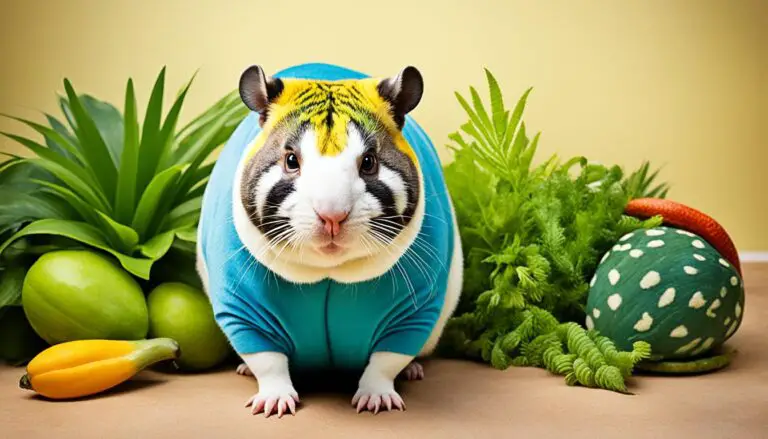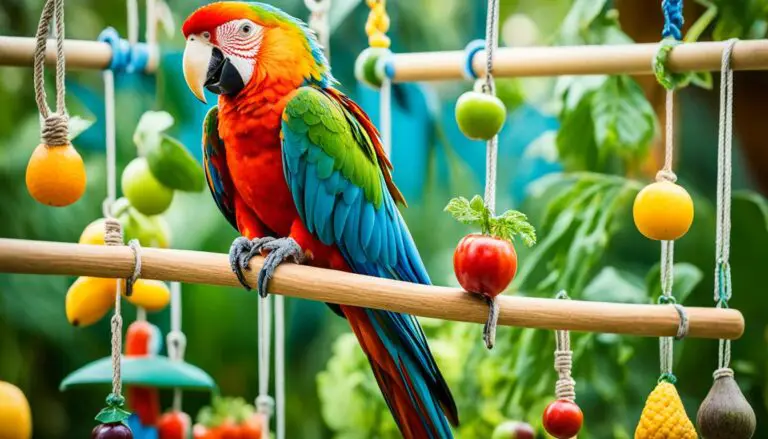Guiding Exotic Pets to Healthier Diets Tips
Transitioning exotic pets to new or healthier diets is vital for their health and well-being. A balanced diet is key for these unique animals. Yet, it can be hard to get them to try new foods. But, with some good strategies, you can lead your exotic pets to a healthier and happier life.
Key Takeaways:
- Transitioning exotic pets to new or healthier diets is important for their overall health and well-being.
- Understanding the specific dietary needs of your exotic pet is crucial before making any changes.
- Introduce new foods gradually to avoid digestive upset or refusal to eat.
- Offer a variety of foods to provide a balanced and nutritious diet for your exotic pets.
- Consult with a veterinarian who specializes in exotic pet care for personalized guidance and advice.
Understanding the Importance of Exotic Pet Diets
Keeping exotic pets healthy means feeding them right. Just like us, exotic pets need special food to stay well. A balanced diet is essential for them to be active and healthy.
Improving exotic pet nutrition boosts their health. Changing their diet and making it better can make a big difference. We aim to upgrade their meals for better health over time.
Switching to a healthier diet needs thought. It’s important to know what they need and how to change their food well. This change is good for their future health.
“If we can improve the nutrition of exotic pets through dietary changes and transitions, we can significantly enhance their overall health and well-being.”
Focusing on a balanced diet for exotic pets is key. This includes making sure they get proteins, vitamins, and minerals they need. Knowing their diet needs helps us make the best choices for their health.
Exotic pets thrive on a varied diet. Mixing up their food gives them many nutrients. Fruits, veggies, and supplements should all be part of their meals.

The Benefits of Exotic Pet Dietary Transition
Switching exotic pets to a healthier diet has many upsides. It can:
- Promote a strong immune system
- Improve overall energy levels
- Enhance digestion and nutrient absorption
- Support healthy weight management
- Maintain proper organ function
- Minimize the risk of nutritional deficiencies
Knowing about exotic pet nutrition and how to change their diet is important. This helps pets live a better, happier life. Understanding their diet helps them get the best food.
| Key Points | Takeaway |
|---|---|
| Exotic pet nutrition improvement | Proper nutrition is crucial for the overall health of exotic pets and requires dietary changes and transitions. |
| Exotic pet dietary changes | Understanding the specific dietary requirements of each species and making appropriate adjustments is necessary for their well-being. |
| Exotic pet diet upgrade | Transitioning to a healthier diet can have significant benefits for the long-term health and quality of life of exotic pets. |
| Exotic pet dietary transition | Implementing gradual and informed dietary transitions can help exotic pets receive the nutrition they need for optimal health. |
Researching Your Exotic Pet’s Dietary Needs
Before you change your exotic pet’s diet, do your homework. Every type of exotic pet needs different foods. Make sure you know what’s safe for them. Talk to vets, check trusted websites, and read pet guides for the best info.
Good nutrition is key for your exotic pet’s health and long life. By feeding them right, you make sure they get all the nutrients they need.
Exotic animals need different foods based on their type, size, and health. Some might need mostly meat. Others might do best with just plants or a mix. It’s important to find out what’s best for your pet by doing your research.
Reliable Sources for Exotic Pet Nutrition
When you’re looking for food info for your exotic pet, trust the right sources. You should consider these reliable choices:
- Veterinarians: A vet who knows about exotic pets is your best friend. They can give you advice that fits your pet’s unique needs.
- Reputable websites: Find top websites on exotic pet care. They have detailed info and guides for feeding your exotic pets the right way.
- Pet care guides: Look for books by experts on how to care for exotic pets. These will also help you know what to feed them.
The Role of Exotic Pet Feeding Improvements
Switching your exotic pet to better food has lots of good outcomes. It can stop them from missing any nutrients, boost their health, and keep them around longer. The right diet also makes them more active, their fur shinier, and keeps them healthy overall.
“Feeding your exotic pet a nutritionally balanced diet is one of the most crucial aspects of responsible pet ownership. It ensures their well-being and enhances their quality of life.”
Table: Examples of Exotic Pet Dietary Transition and Improvements
| Exotic Pet Species | Current Diet | Optimal Diet Transition | Benefits |
|---|---|---|---|
| African Grey Parrot | Seeds and nuts | High-quality pellets, fresh fruits, and vegetables | Improved feather condition, enhanced immune system |
| Bearded Dragon | Insects and commercial reptile food | Leafy greens, vegetables, and occasional insects | Better digestion, proper growth, and healthy skin |
| Hedgehog | Commercial hedgehog food | Insect-based protein, fruits, vegetables | Healthier weight, reduced risk of obesity |
Always check what your pet needs based on their species. And don’t forget to talk with a vet for a smooth diet change.
Introducing New Foods Gradually
Changing a pet’s diet, like exotic ones, requires a careful strategy. Sudden changes can cause stomach issues or make them not want to eat. Slowly introducing new foods helps your pet get used to them, avoiding health problems.
At first, mix small amounts of new food with their usual meals. This lets your pet get used to different tastes and textures. Then, over time, you can increase the new food and decrease the old food. This helps their stomach adjust, making the switch easy.
Benefits of Introducing New Foods Gradually
“A gradual transition reduces the risk of digestive upset and provides enough time for the exotic pet to develop a taste for the new diet,” explains Dr. Rebecca Stevens, an exotic pet veterinarian.
By slowly adding new food, your pet can learn to like it. Even if they’re unsure at first, most pets will adjust with time and care.
This approach also lets you watch how your pet’s stomach handles the change. If they have issues, you can slow down or change the plan. Watching their behavior and eating habits is key to a successful swap.
Also, going slow helps you learn what they prefer or avoid. It shows you if there are any foods they just won’t eat. This way, you can choose what to offer next more wisely.

Sample Transition Plan
Here’s a way to gradually change their food:
| Week | Proportion of New Food | Proportion of Old Food |
|---|---|---|
| Week 1 | 25% | 75% |
| Week 2 | 50% | 50% |
| Week 3 | 75% | 25% |
| Week 4 | 100% | 0% |
In this plan, you increase the new food by 25% weekly, while decreasing the old food. By week 4, they’ll be fully on the new diet.
Every pet adjusts differently, so watch how yours does. It’s important to change the plan if you see they’re not doing well. If you’re not sure, a vet who knows about exotic pets can offer advice tailored for your pet.
Providing Variety in their Diet
Just like us, exotic pets are at their best with a varied diet. This includes lots of fruits, veggies, proteins, and supplements. By offering many new foods, you keep them engaged and healthy.
Giving your exotic pet a mix of foods lets them explore different tastes and textures. It makes their meals more than just eating. Plus, it helps them stay away from boredom and ensures they get all needed nutrients.
Remember, not all foods suit every exotic pet. Make sure what you offer is safe and good for their health. Start slowly to let them adjust to new items.
Benefits of a Varied Diet for Exotic Pets
A varied diet can be a game-changer for exotic pets. It does a lot for their health and happiness:
- Nutritional Balance: Eating various foods means they get all the nutrients they need for a balanced diet.
- Increased Mental Stimulation: Trying out new foods regularly keeps your pet sharp and prevents them from getting bored.
- Prevention of Nutritional Deficiencies: A mix of foods makes sure they won’t lack any important nutrients.
- Promotion of Healthy Eating Habits: It teaches them to love trying new foods from when they are young.
Always keep an eye on how your pet reacts to new foods. Adjust what they eat based on their tastes and any bad reactions.
Introducing Variety Safely
To safely introduce new foods, go slow. Start by giving them small bits of new items mixed with their regular food. Keep an eye on how they eat and how they feel after.
If they really don’t like something, find an alternative within their diet needs.
“A varied diet not only provides essential nutrients but also keeps exotic pets mentally stimulated and interested in their meals.” – Dr. Rebecca Carter, Exotic Pet Specialist
Stay away from foods that can harm your pet, like toxic items or those that are too fatty or salty. Always ask a vet with knowledge about exotic animals if unsure about food safety.

Providing a range of foods is vital for your exotic pet’s health. It keeps them well-nourished and excited about eating. With careful steps and observation, you can customize their diet for maximum health and happiness.
Monitoring and Adjusting Portion Sizes
Portion control is vital for the health of exotic pets. It’s key to watch how much they eat and adjust as needed. This helps keep their diet in balance.
Check your exotic pet’s weight and how they look. This will ensure they are healthy and not too skinny or too heavy. Also, observe their behavior to see if they are happy with their food.
Changing what your pet eats might need a slow start. You may need to adjust their food portions bit by bit. This helps them get used to their new diet.
For the right food amounts, always talk to a vet. They can give advice specific for your pet. Vets look at your pet’s age, type, how active they are, and health. Then, they suggest the best food and how often to feed them.

Portion Control Tips for Exotic Pets
Here’s how to manage your exotic pet’s food amounts:
- 1. A kitchen scale is great for exact food portions, like with store-bought food.
- 2. Break the daily food up into several meals to stop overeating and help digestion.
- 3. Change food amounts over time, based on your pet’s weight and any new diets.
- 4. Check your pet’s ribs to confirm if they’re at a healthy weight. Adjust food as needed.
- 5. Watch out for too many treats. They can make your pet eat too much. Pick treats that are good for them.
“Right food portions keep exotic pets healthy and at the right weight. Always ask a vet for advice. They’ll make sure your pet eats well.” – Dr. Emily Johnson, Exotic Pet Vet
| Exotic Pet | Recommended Portion Size |
|---|---|
| African Pygmy Hedgehog | 1-2 tablespoons of high-quality insectivore diet per day |
| Green Iguana | 80% vegetables, 10% fruits, 10% protein; portion depends on size and age |
| Red-Eared Slider Turtle | Avoid overfeeding; amount should fit in the size of their head |
| Sugar Glider | 2-3 tablespoons of a balanced sugar glider diet per day |
Making Food Appealing and Dealing with Picky Eaters
Exotic pets can sometimes be picky eaters, not wanting to try new foods. Making their new diet fun, is the key. You should try adding different foods that look and taste different. You even try freezing some foods or putting them in puzzle feeders. Remember, being patient and not giving up is important. They might learn to enjoy the new tastes.
Picky eaters can be tough, but there are smart ways to help them. Offering tastier food can make a big difference. You can make their meals more exciting by trying new ways of serving food. Freezing their snacks can make their mealtime more fun. Also, puzzle feeders are great for keeping them interested during eating.
“Introducing new foods to picky eaters requires patience and creativity. By offering a variety of textures and flavors, you can pique their interest and encourage them to explore a wider range of foods. Don’t be discouraged if they initially resist or show disinterest. With time, they may develop a taste for the new foods and embrace a healthier diet.”
Dealing with Picky Eaters: Tips and Tricks
Understanding and showing empathy are crucial when handling picky exotic pets. Here are tips to make them eat healthier:
- Gradual Transition: Mix new foods with the old gradually. Start with small bits and increase the new foods slowly.
- Variety is Key: Keep their meals interesting by changing the textures and flavors. Add a mix of fruits, veggies, and proteins.
- Food Presentation: Make meals exciting by trying different serving styles. Freezing snacks or using puzzle feeders can catch their interest.
- Be Patient: It might take a while for them to like new foods. Stay calm and keep trying new foods with them.
- Seek Veterinary Advice: If you’re really stuck, a vet who knows about exotic pets can offer help. They can give you advice customized for your pet.
With patience and the right approach, most picky eaters will come around. Remember, every exotic pet is different, so watch how your pet reacts. Always consult with a vet to make sure they’re getting the right nutrition. Over time, you’ll see your pet moving toward a healthier diet.
Consulting with a Veterinarian
Consulting a vet is key for your exotic pet’s diet changes. Vets with exotic pets’ expertise know what each species needs. They offer advice tailored to your pet.
A vet can be vital in changing your pet’s diet. They will create a plan to fit your pet’s nutrition, suggesting supplements if needed. Together, you make sure the diet is just right for your pet.
Vets also watch your pet’s health as you switch diets. They look at how changes affect your pet and adjust as necessary. Regular visits make sure your pet gets what it needs.
Every exotic pet is different, so their diets are too. Vets give advice specially made for your pet. This includes their breed, age, how active they are, and any health issues. Getting their advice is the best way to keep your pet healthy.
Why Consult with a Veterinarian?
Consulting with a vet is crucial for safe diet changes in exotic pets. Their expertise ensures the food plan fits your pet perfectly.
– Dr. Mary Johnson, Exotic Pet Specialist
Recognizing Signs of Nutritional Deficiencies
Nutritional deficiencies can seriously impact exotic pets. Recognizing signs early is key. Look for signs that their diet may be lacking. Being observant can help you spot issues and act quickly for their health.
Signs of Nutritional Deficiencies
Here are common signs of a nutritional deficiency in exotic pets:
- Changes in appetite: If your pet suddenly stops eating or loses interest in food, it could be a bad sign.
- Weight loss: A sudden, unexplained drop in weight means they might not be getting enough food.
- Dull coat: If your pet’s fur looks lifeless or dry, their diet might be lacking in key nutrients.
- Digestive issues: Watch for any stomach problems like diarrhea or constipation, as these can also point to a lack of nutrition.
Seeing these signs means it’s time to take action. Get your pet checked by an exotic animal vet. They can run tests and adjust the diet as needed.
A healthy diet is crucial for exotic pets. Making sure they get all the nutrients they need keeps them happy and thriving.
Conclusion
Taking care of exotic pets starts with good research and talking to a vet. Understand what your pet needs to eat and offer them a mix of foods to stay healthy. Keep an eye on how they’re doing to make sure they’re getting all they need.
When changing what your pet eats, go slow and fix any missing nutrients fast. A vet can give you advice made just for your pet. These steps will help your exotic pet live their best life.
Looking after your exotic pet’s health by changing their diet is a big step. It takes time and work, but it’s so rewarding. Eating right can really boost how long and well they live.
Watch how your pet reacts as you change their food, and adjust as needed. If you’re unsure, a vet with experience in exotic pets can guide you. They’ll help you create a diet that’s just right for your special pet.
FAQ
What is the importance of providing a healthy and balanced diet for exotic pets?
How can I research my exotic pet’s specific dietary needs?
How should I transition my exotic pet to a new or healthier diet?
How can I provide variety in my exotic pet’s diet?
How should I monitor and adjust portion sizes for my exotic pet?
What should I do if my exotic pet is a picky eater?
Why is it important to consult with a veterinarian when making dietary changes for exotic pets?
What are the signs of nutritional deficiencies in exotic pets?
How can I ensure a successful transition to a new or healthier diet for my exotic pet?
Source Links
- https://animalfamilyveterinarycare.com/blog/exotic-pet-care-davenport/
- https://exoticnutrition.com/blogs/blog/the-perfect-diet-for-exotic-pets
- https://www.oakhurstvet.com/blog/eating-right-understanding-exotic-pet-nutrition-and-feeding-habits/
Peter Stones is the founder of Exotic Pets Place, the leading online resource for exotic pet care information.
With over 10 years of hands-on exotic pet ownership experience, he is deeply passionate about sharing his expertise to help others properly care for their unusual pets.
When he's not writing extensively researched articles or connecting with fellow exotic pet enthusiasts worldwide, you can find Peter at home tending to his own beloved menagerie of exotic animals.

